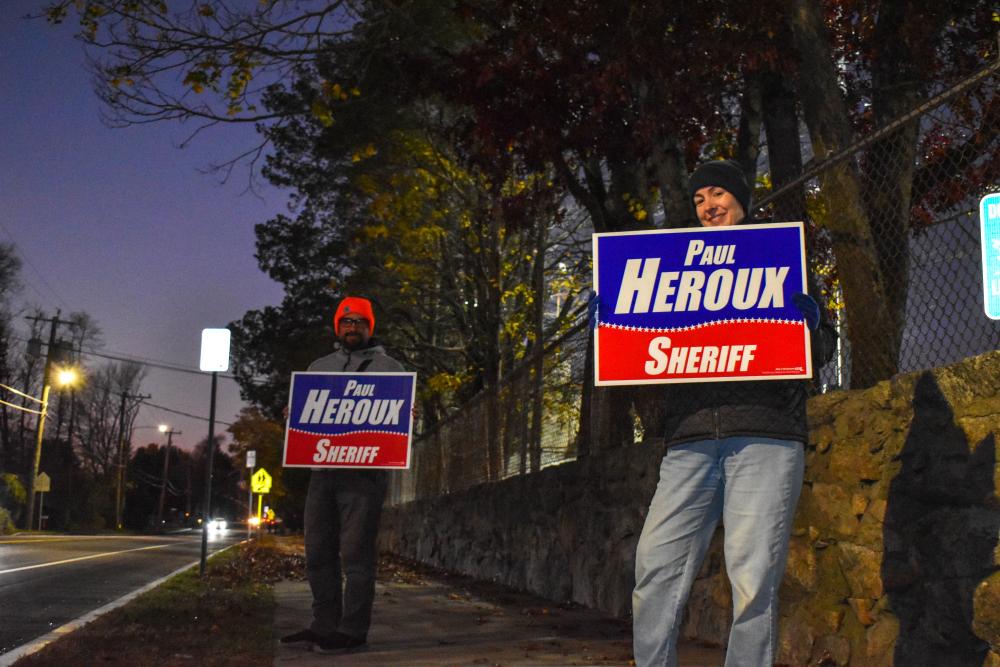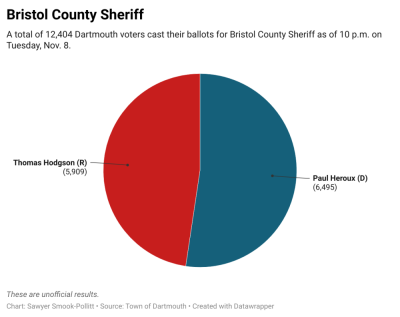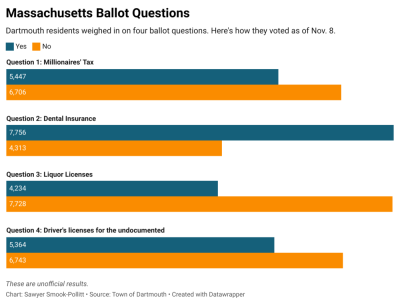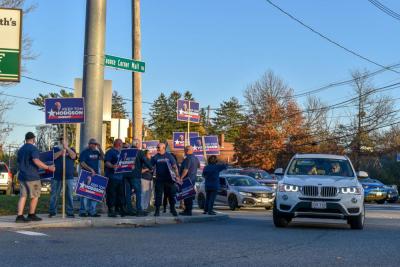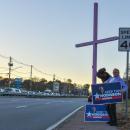Dartmouth favors Heroux for sheriff, Hodgson concedes
There’s going to be a new sheriff in town.
After 25 years in office, Republican Thomas Hodgson was defeated by Democratic Challenger Paul Heroux early Wednesday. This was the first contested race for sheriff since 2010.
Though results were still trickling in, Hodgson admitted defeat at 1:15 a.m. on Nov. 9. As of press time, Heroux led Hodgson 50.4% to 49.6%.
“We’re obviously disappointed,” Hodgson said. “But the people of this county have made their decision and we have to honor that — it’s now time to turn a page.”
Hodgson added that he wishes Heroux well as his successor.
Heroux, who currently serves as mayor of Attleboro, thanked his team of volunteers, along with the voters of Bristol County for making the win possible.
“It’s time for change,” he said. “It took us to the last community — there’s a reason for everything.”
With the win, Heorux said his top priorities are inmate rehabilitation, evaluating programs to learn what works and what doesn’t in hopes of setting up inmates for “successful reentry” into the public, and finding ways to reduce the number of suicides in the county’s jails in Dartmouth and New Bedford.
According to the New England Center for Investigative Reporting, at least 16 people died by suicide between 2006 and 2017 while in the custody of the Bristol County House of Correction — the highest number in the state during that period.
Heroux, who previously worked in prison and jail administration in Pennsylvania and Massachusetts, added that he does not intend to clean house once he begins his six-year term as sheriff.
“I respect the institutional knowledge people have,” he said. “They know what can be done and what can’t.”
Of course, he said this will be done with the expectation that employees be honest with their opinions.
“If you’re not honest with me, you’re worthless,” Heroux said. “You’re not only worthless, in an environment like that, you’re dangerous.”
It remains unclear when Heroux officially takes over the sheriff’s position, but Hodgson said he will provide any help he can during the transition period.
Much like the county, Dartmouth also favored Heroux.
According to unofficial results, Heroux took in 52% of votes, while Hodgson received 48%.
Precinct 7 voter Allison Paiva was among the Heroux supporters. She said her reason for choosing the Attleboro mayor was because she is not a fan of the way Hodgson has run the county’s jails for the past 25 years, particularly when it comes to treatment of inmates.
“He’s done things that are just inhumane,” she said.
Meanwhile, Precinct 2 voter Kathy Normore contended that Hodgson “has been doing a great job.” What she particularly likes is Hodgson’s “tough on crime” stance.
“I don’t want to see people in jail forever, but I also don’t want to see a person slapped on the wrist, out the next day and arrested on another charge,” she said.
In other races, Dartmouth voters, much like the rest of the commonwealth, favored Maura Healey for governor. According to the town results, Healey won 54% over Republican Geoff Diehl, who got 46% of the Dartmouth vote.
Several local incumbent candidates ran unopposed: Mark Montigny (D-New Bedford) for State Senate, Chris Markey (D-Dartmouth) for the State House of Representatives, and Thomas M. Quinn III for District Attorney.
12,600 Dartmouth residents voted in the election, representing 53.5% of those registered. In 2018, 10,418 residents — 46.64% of registered voters — cast a ballot in that year’s election.
Among those with a significant boost in votes cast was Precinct 3, which shifted from its old location at the Dartmouth Bible Church to UMass Dartmouth.
Precinct worker John Botelho said there was some apprehension at first over the readiness of the students volunteering, but said they were able to get a hold of things pretty quickly to get voters in and out with little to no hassle.
“It took them about 10 minutes,” he said with a laugh. “They’re very, very smart.”
Hailey Garvey, a freshman at UMass Dartmouth, was the 114th voter to cast a ballot at the new precinct. She said casting her first-ever ballot in a general election was “a little nerve-wracking, but exciting.”
What drove her to the polls was to support candidates who would stand up for issues such as retaining access to abortion care and marriage equality.
Garvey also was a big proponent of Question 4, saying it's important to let all who live in Massachusetts participate in daily life, regardless of citizenship status.
“People have the right to be residents whether they were born here or not,” she said.
However, the majority of Dartmouth voters disagreed, with 56% opposing the question and 44% supporting it.
Dartmouth voters also came down against Question 1 — which would impose a 4% tax on earnings over $1 million — by a margin of 55% to 45%.
Likewise, the town voted against Question 3, which would make changes to regulations concerning retail liquor licenses, with 65% opposed and 35% in favor.
The only ballot question that was supported by Dartmouth voters was Question 2, which would require dental insurance companies to spend at least 83% of their budgets on patient care or quality improvements. The question received support from 64% of respondents, with 36% opposed.



